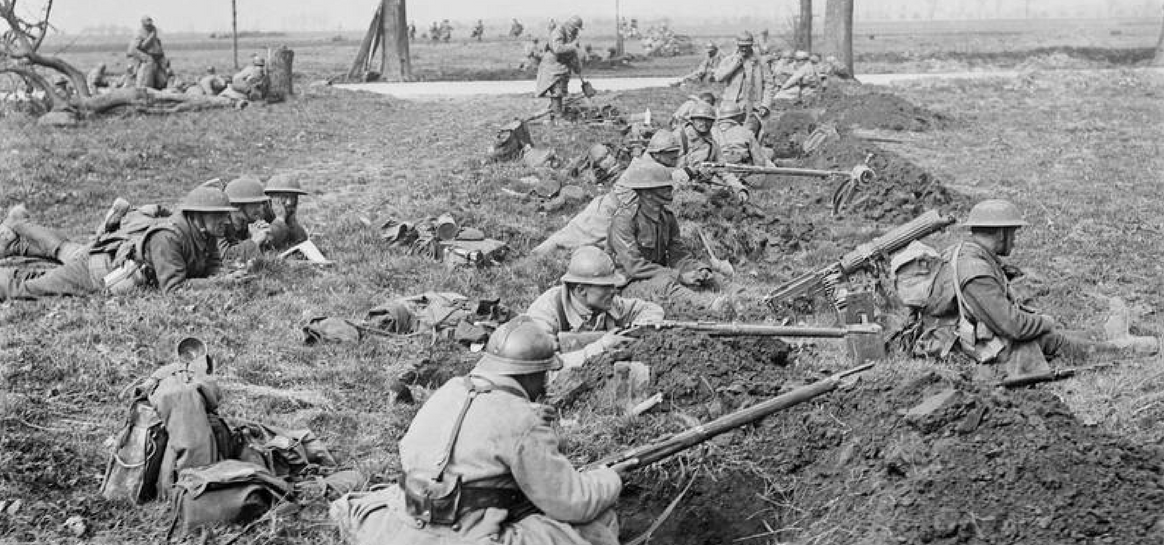Shortly before dawn on March 21, 1918, British troops on the Western Front of WWI awakened to heavy artillery fire. The ensuing five-hour-long barrage was so relentless that at least one German soldier on the firing end was nearly deaf for days afterward.[1] When the shells stopped falling, the German infantry crossed no man’s land to ambush the British line under the cover of thick fog. This was the beginning of the German Spring Offensive, an overwhelming attack whose first phase was dubbed “Operation Michael.”
Years later, Lucy Maud Montgomery described the effect of this onslaught upon the home front in Canada:
“In March of the year of grace 1918 there was one week into which must have crowded more of searing human agony than any seven days had ever held before in the history of the world. . . . everywhere the hearts of men were failing them for fear.”[2]
For the women and men at home, the agony was compounded by the perpetual helplessness of awaiting word from overseas, and the challenge of sorting fact from rumor between newspaper headlines. Thus, in Montgomery’s novel Rilla of Ingleside, Anne and Gilbert Blythe’s youngest daughter comes of age in a world that must repeatedly hold its breath.
By the time news of Operation Michael reaches the island village of Glen St. Mary, Rilla has already lost one cherished older brother. To honor his life, she vows to “keep faith” with the fallen, working to preserve a world in which laughter and courage and beauty ring truer and higher than oppression and suffering.
Even so, the reports of March 21 deal a staggering blow. In the long days of waiting to hear the outcome of the battle, Rilla’s former teacher voices the uppermost thought in every tense mind:
“I can think of nothing but the question,
‘Does the line still hold?’”
One month ago, I sat down in my room for a brief moment, considering the possible outcomes of a round of medical tests I was facing. I had barred fear from wreaking havoc on my thoughts, but uncertainty still hung over my head, and I felt a bit like the plaster was falling off the rattled ceiling of some old room within.
Into that space came the unbidden image of certain faces scattered far and wide. I thought of Lancia in Denver and Esther in Oregon, of Deborah in Virginia and Bri and Amanda in my hometown; I remembered some beloved writers in the American South and the United Kingdom, as well as the member artists of the Anselm Guild.
Each one signaled a place where I felt sure that the beauty of God, the surety of His goodness, and the supremacy of His Word would not go unnoticed. The lasting glories I had seen shining through quiet faithfulness and everyday worship, the homes where doors were opened wide and blooms were planted and music was made in the name of our Lord — I knew these would go on even if the sky flickered over my own corner, and something about that realization lifted some of the present grey pall.
All this I would have said if someone had been in the room with me, but the unexpected phrase that came to my mind was shorter, and sufficient.
“The line still holds.”
Having never seen military combat firsthand, I think I would shy away from the language of war in describing faith if the connection were not made multiple times in Scripture. The demands and devastation of armed conflict are too costly for glib use. L. M. Montgomery’s own view of war — especially in her posthumously published The Blythes Are Quoted — grew to have more in common with the stark poetry of Wilfred Owen and Siegfried Sassoon than a patriotic pamphlet.
Yet even in its idealistic moments, Rilla touches upon a universal theme. Glen St. Mary’s mothers and sisters and sweethearts must strive against despair, and sacrifice as much as every soldier who leaves for the trenches — and perhaps more, for as Rilla says,“Our boys give only themselves. We give them.”
War is always more than a series of strategic movements between armies; it is more than the effort to raise funds and ration supplies domestically.
War is the default state of the inherited human condition, and I know that I resonate with this century-old Canadian story because the fight to champion love over power, to give our lives for others, and to trust the Creator is an age-old struggle.
The simple act of drawing breath on earth engages us in a war involving body and spirit. No man, woman, or child escapes unscathed; whether on the home-front in 1918 or in relative peacetime in 2019, we are ever hounded by our fallibility, our mortality, and our fear.
But in any war, much depends upon the actions of one’s countrymen. If they abandon their posts in battle or betray their neighbors to the enemy at home, the nation collapses. But if they stand their ground — ah, what then?
After the “Black Sunday” following Operation Michael, the women of Ingleside and Glen St. Mary rouse themselves. They choose to make the most of their time and place in spite of uncertain ends. “Battered but not broken,” declare Monday’s headlines regarding the Allied forces, and the women also push on; so long as the fighting continues, so shall their work. They make meals, even when no one has the appetite to eat them, and they comfort frightened children; they give up peony beds for wartime potatoes, and run up the flag to commemorate every victory overseas as the entrenched crimson tide of the war begins to turn. These are the stalwart souls whom Montgomery describes from her contemporary viewpoint as “courageous, unquailing, patient, heroic”; these are the women who “[make] victory possible.”[3] In the end, their part in WWI is as vital to the outcome as that of the soldiers abroad.
In the days when my world feels shaken, I often think of the echoes I hear from battlefields far off. Artists, writers, surgeons, minister’s wives, potters, electrical engineers, and homemakers are holding their ground this minute against hopelessness, texting thankful observations from hospital rooms, waiting for the dawn to bring new mercies and fresh joy. They have chosen to take any valley roads that lie between them and their long home, and to report the unfailing presence of their Shepherd along the way.
From them, I am learning how to give up the counting of my days to the One who holds their unspooling in His hand. The strength of resolve I see in them bolsters my own: if He made this life to some purpose, then to that purpose let it be utterly surrendered. “Keeping the faith” for me will mean paying attention, mothering, writing, reading, accepting interruptions, making time for conversations, planting tulips and herbs — and above all, realizing that the position I hold matters as one link in the long front line of an unseen kingdom. Together with those to my left and right, I hope it will be said that we stood firm to the last in the bleak hour; that we prayed for our neighbors and readers, and rejoiced in the encouragement of even one soul; that all along the front we passed the rallying refrain, “Take heart! He has overcome the world.”
For the line still holds. While here and there we may momentarily be deafened by the sheer bombardment of shells crashing, the front has neither caved nor collapsed, and the Lord of Hosts is leading the charge.
When local rumor suggests, for one terrible instant, that the German offensive has succeeded — and that the war is lost — Rilla slips away to a nearby valley. There she bows her head and asks simply for strength — and courage — and better news on the morrow.
Montgomery then gives an image that shows how much her young protagonist has grown since the early chapters: “She knelt there a long time, and when she went back to Ingleside she was calm and resolute.”[4] Borne up by the memory of those who have gone before, and with a petition to that Very Present Help, Rilla does keep the faith.
And by the same supply of strength in and around me, I dare to think that I shall too.
[1] “Voices of the First World War: The German Spring Offensive. https://www.iwm.org.uk/history/voices-of-the-first-world-war-the-german-spring-offensive
[2] L. M. Montgomery, Rilla of Ingleside (New York, NY: Puffin Books, 1993), 271.
[3] Rilla, 286.
[4] Rilla, 274-275.
The featured image is of the French 22nd Division and British 20th Division covering a road near Nesle, 25th March 1918. © IWM Q10810
Amy Baik Lee is a contributing writer for Cultivating Magazine and the Rabbit Room, a literary member of the Anselm Society Arts Guild, and the author of This Homeward Ache. A lifelong appreciator of stories, she holds an MA in English literature from the University of Virginia and still “does voices” when she reads aloud. She writes at a desk that looks out on a small cottage garden in Colorado, usually surrounded by her husband’s woodworking projects, her two daughters’ creative works, and patient cups of rooibos tea.
Leave a Reply
A Field Guide to Cultivating ~ Essentials to Cultivating a Whole Life, Rooted in Christ, and Flourishing in Fellowship
Enjoy our gift to you as our Welcome to Cultivating! Discover the purpose of The Cultivating Project, and how you might find a "What, you too?" experience here with this fellowship of makers!


How beautiful and brave of you to share this! Praying for you that all will be well!
Jordan, that means a great deal to me; thank you very much for your kind words and prayers!
The line still holds. Thank you for this, Amy. Such a beautiful reminder that though we may feel overwhelmed and defeated, the Lord of Hosts leads the charge and has already won the victory.
A truly cheering affirmation to read today, Gillian; thank you for calling back to me and letting me know that the line holds!